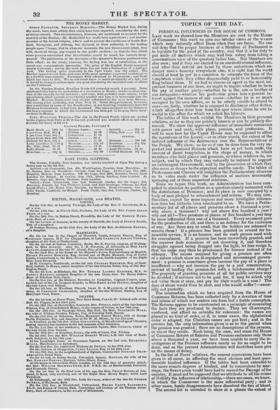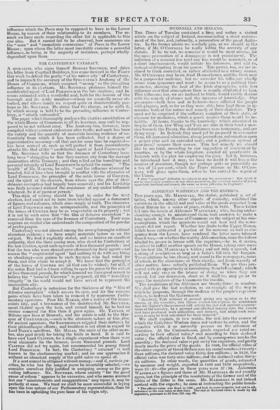TOPICS OF THE DAY.
PERSONAL INFLUENCES IN THE HOUSE OF COMMONS.
LAST week we showed how the Members are sent to the House of Commons ; this week we give our tabular views of the WARPS which may naturally affect them when they are there. No one will deny that the proper business of a Member of Parliament is to legislate for the good of the country, and that it is his 'duty to put aside all motives which may lead him astray from taking a conscientious view of the question before him. But Members are also men ; and if they are elected by an unconstitutional influence, and after their arrival are beset by those seductions which en danger men's honesty everywhere else, it is right that the world should at least be put in a condition to estimate the force of the temptation which they either disgracefully yield to or honourably fling behind them. If we had to choose an agent in the most important business of our lives, we ought to inquire whether he be in the pay of another party—whether he is the son or brother of our antagonist—whether his profession gives him a general interest against the success of our cause—whether he is so much occupied . by his own affairs, as to be utterly unable to attend to ours—or, lastly, whether he is engaged to discharge other duties, which altogether draw him from the spot where alone he can be useful in the affair for which we solicit his labours.
• The tables of this week exhibit the Members in their personal relations, as far as they are publicly known or can be publicly dis cussed. We show the apparent influence of immediate connexion with power and rank, with place, pension, and profession. It will be seen how far the Upper House may be supposed to affect the operations of the Lower,—or in other words, the extent of the indirect influence of the Aristocracy over the Representatives of the People. We show, as far as it can be done from the very im perfect and confused Returns which have as yet been made, the amount of direct temptation, in the shape of money, to which members who hold places and pensions, or whose relatives do, are subject, and by which they may naturally be induced to support an extravagant Government, and by the possession of which they also serve as decoys to the expectant and the needy. The tables of Professions and Classes will enlighten the Parliamentary observer as to votes made under the influence of motives necessarily springing out of these important relations. Since we began this work, an Administration has been compelled to abandon its position on a question closely connected with the distribution of Pensions ; and its place is now occupied by a body of men pledged to retrenchment and reform. We may now, therefore, expect far more copious and more intelligible information than has hitherto been vouchsafed to us. We have a Parliamentary list of all places and pensions above a thousand a year: why above a thousand? why not above five hundred a year ? why not all ?—Two pensions or places of five hundred a year may be more influential than one of a thousand. Every argument goes for the production of all, and there is no defence for the exclusion of any. Are there any so small, that the holders are ashamed to receive them? If a pension has been granted in reward for honourable service, it is an honour, and no such person need wish for concealment. If a pension has been unworthily granted, and the receiver feels conscious of not deserving it, and therefore struggles against being dragged into the light, let him resign it, that his name may then be proclaimed for honour instead of for obloquy. The causes assigned for giving a pension are often of a nature which show an ill-regulated and mismanaged government: a pension is sometimes given because the pay of a place is insufficient — why not increase.the pay to a just remuneration, instead of loading the pension-list with a burdensome charge? The propriety of granting pensions at all for public services may be doubted: if services are to be paid for, it may be asked, why not value them at once, and pay for their worth in a sum ? The door of abuse would thus be shut, and who would suffer ?—assuredly not posterity. The information which we have acquired from the House of Commons Returns, has been collected only by a devotion of time and labour of which our readers can form but a feeble conception. The Returns appear to be constructed on a principle of concealing the facts they are produced to declare. They are ill-arranged, confused, and afford no subsidia for reference : the names are placed in no kind of order, or if, in some cases, the alphabetical order is adopted, the Christian names are put first ; and in the pension list, the only information given is as to the period when the pension was granted ; there are no descriptions of the persons, or where they reside. Such being the case, and since the House of Commons Return of Salaries and Pensions embraces only those above a thousand a year, we have been unable to carry the investigation of the Pension influence nearly so far as ought to be done, and as the present Administration will doubtless soon give us the means of doing. In the list of Peers' relatives, the nearest connexions have been given in all cases, as affording the most obvious and least questionable kindred influence. If the tables had been extended to the more remote degrees of kindred, and to connexions by marriage, the SPECTATOR would have had to record the Peerage of the country. It must not be supposed that we attribute to all the scions of Nobility the influence of relationship,—there are cases, we know, in which the Commoner is the more influential party ; and in other cases, family disagreements have dissolved the ties of blood. The second list is intended to show at a glance the extent of influence which the Peers may be supposed to have in the Lower House, by reason of their relationship to its members. The remark we have made regarding the other list is applicable to this one also. But it cannot fail to be observed, how numerous are the "sons" and "immediate connexions ". of Peers in the Lower House ; upon whom the latter must inevitably exercise a powerful influence, as being, in the majority of instances, perhaps wholly -dependent upon them.



























 Previous page
Previous page